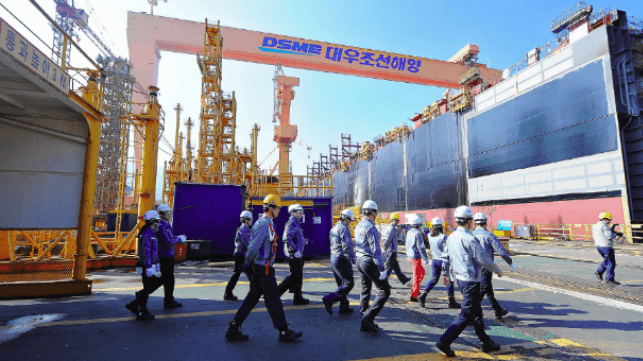Korean Shipyard Workers Stage First Coordinated Warning Strike

In a first for the South Korean shipbuilding industry, union members staged their first coordinated work stoppage today, August 28, to place additional pressure on the industry during ongoing contract negotiations. The brief actions were due to stop work Wednesday afternoon for between three and five hours and were reaching not only the three major shipbuilders but also the yards of several midsized builders.
The unions representing the individual yards formed the Shipbuilding Industry Union Solidarity (KTCU) to coordinate the 2024 contract negotiations. Many of them are affiliates of the Korean Metal Workers’ Union, one of the largest in the country.
KMU officials said there have been five rounds of negotiations without an acceptable proposal from the shipbuilders. They are demanding increases in basic salaries, a wage peak system, changes to the bonus system, and raising the retirement age from 60 to 65. Critically, they are also demanding more new hires to address the current shortage of workers and difficult working conditions.
The strike comes they point out as the industry has been averaging a utilization rate in 2024 of over 105 percent, the highest in the last five years. The shipbuilders returned to profitability in 2023 and have multi-year backlogs. Reports put the current value of the orderbook for the three largest builders at over $140 billion, with calls from the union to share the profits with members.
Union leaders served notice of the plan to stage the first warning strike during the negotiations in July. Today they reported that the effort was expanded at the largest HD Hyundai Heavy Industries yard in Ulsan to include all workers versus an original plan of just union leaders. Work also stopped at the HD Hyundai Samho yard and Hanwha Ocean. HD Hyundai Mipo members had not yet obtained authorization to strike so only the strike committee participated at the yard while at Samsung Heavy Industry the union set up tent protests.
Similar actions were planned for the midsized builders. Members at both HSG Seongdong Shipbuilding and K Shipbuilding participated in the work stoppage. The efforts ranged from Ulsan to Geoje, Tongyeong, Yeongam, and Busan in a unified show of solidarity among the union branches.
Despite having conducted 20 negotiating sessions union leaders said they are committed to continuing the negotiations while demanding concessions from the companies. The union reports members will rally in Ulsan on September 4 and in Geoje on September 9. They said if there was no progress before the Chuseok holiday (September 16 to 18, 2024) they would launch a plan for a “stronger struggle” after the holiday.
The shipbuilders have cautioned that any extended work stoppages would risk this year’s scheduled ship deliveries. The union rejects the assertion by the shipbuilders that the actions are potentially harmful to the industry’s reputation and could lower the competitiveness and international credibility of Korean shipbuilding.
An extended strike at the then Daewoo Shipbuilding & Marine Engineering shipyard in 2022 contributed to the worsening financial condition of the company. Workers were off the job for 51 days and it participated the sale of the company to Hanwha in 2023.











 Olena Semykina voted for President Volodymyr Zelensky in 2019 but is disappointed he has been unable to end the war © Roman PILIPEY / AFP
Olena Semykina voted for President Volodymyr Zelensky in 2019 but is disappointed he has been unable to end the war © Roman PILIPEY / AFP Zelensky's popularity rating has fallen sharply, polling indicates © Roman PILIPEY / AFP
Zelensky's popularity rating has fallen sharply, polling indicates © Roman PILIPEY / AFP








